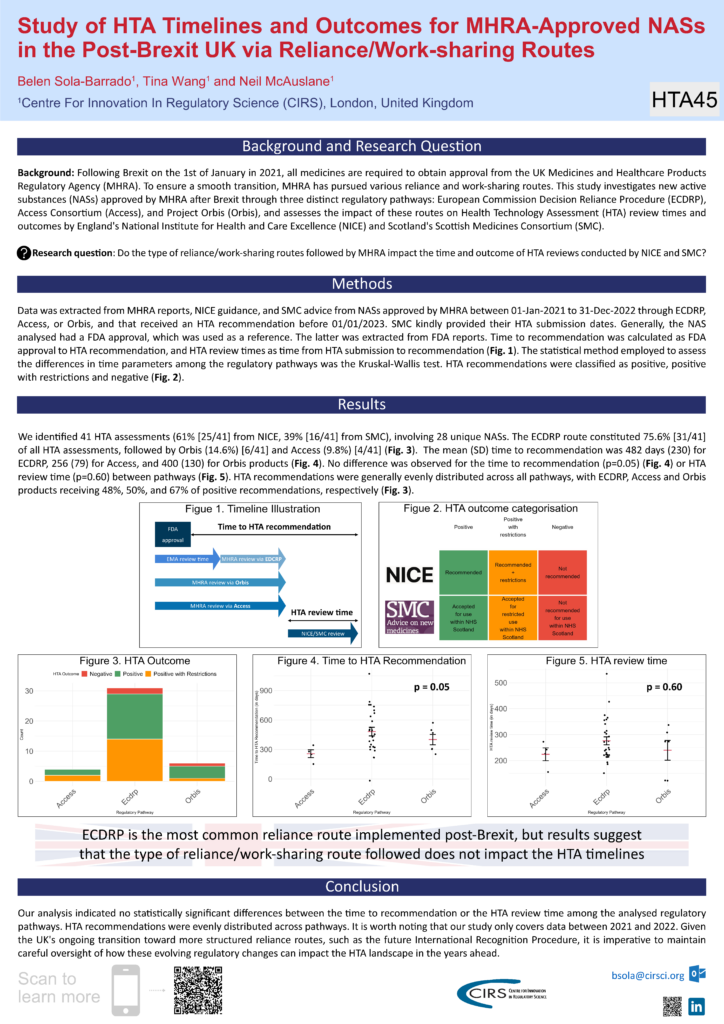During ISPOR Europe 2023 in Copenhagen, Belen Sola presented a poster entitled ‘Study of HTA Timelines and Outcomes for MHRA-Approved NASs in the Post-Brexit UK via Reliance/Work-sharing Routes‘.
Background: Following Brexit on the 1st of January in 2021, all medicines are required to obtain approval from the UK Medicines and Healthcare Products Regulatory Agency (MHRA). To ensure a smooth transition, MHRA has pursued various reliance and work-sharing routes. This study investigates new active substances (NASs) approved by MHRA after Brexit through three distinct regulatory pathways: European Commission Decision Reliance Procedure (ECDRP), Access Consortium (Access), and Project Orbis (Orbis), and assesses the impact of these routes on health technology assessment (HTA) review times and outcomes by England’s National Institute for Health and Care Excellence (NICE) and Scotland’s Scottish Medicines Consortium (SMC).
Research question: Do the type of reliance/work-sharing routes followed by MHRA impact the time and outcome of HTA reviews conducted by NICE and SMC?
Methods: Data was extracted from MHRA reports, NICE guidance, and SMC advice from NASs approved by MHRA between 01-Jan-2021 to 31-Dec-2022 through ECDRP, Access, or Orbis, and that received an HTA recommendation before 01/01/2023. SMC kindly provided their HTA submission dates. Generally, the NAS analysed had a FDA approval, which was used as a reference. The latter was extracted from FDA reports. Time to recommendation was calculated as FDA approval to HTA recommendation, and HTA review times as time from HTA submission to recommendation (Fig. 1). The statistical method employed to assess the differences in time parameters among the regulatory pathways was the Kruskal-Wallis test. HTA recommendations were classified as positive, positive with restrictions and negative (Fig. 2).
Results: We identified 41 HTA assessments (61% [25/41] from NICE, 39% [16/41] from SMC), involving 28 unique NASs. The ECDRP route constituted 75.6% [31/41] of all HTA assessments, followed by Orbis (14.6%) [6/41] and Access (9.8%) [4/41] (Fig. 3). The mean (SD) time to recommendation was 482 days (230) for ECDRP, 256 (79) for Access, and 400 (130) for Orbis products (Fig. 4). No difference was observed for the time to recommendation (p=0.05) (Fig. 4) or HTA review time (p=0.60) between pathways (Fig. 5). HTA recommendations were generally evenly distributed across all pathways, with ECDRP, Access and Orbis products receiving 48%, 50%, and 67% of positive recommendations, respectively (Fig. 3).
Conclusions: Our analysis indicated no statistically significant differences between the time to recommendation or the HTA review time among the analysed regulatory pathways. HTA recommendations were evenly distributed across pathways. It is worth noting that our study only covers data between 2021 and 2022. Given the UK’s ongoing transition toward more structured reliance routes, such as the future International Recognition Procedure, it is imperative to maintain careful oversight of how these evolving regulatory changes can impact the HTA landscape in the years ahead.

